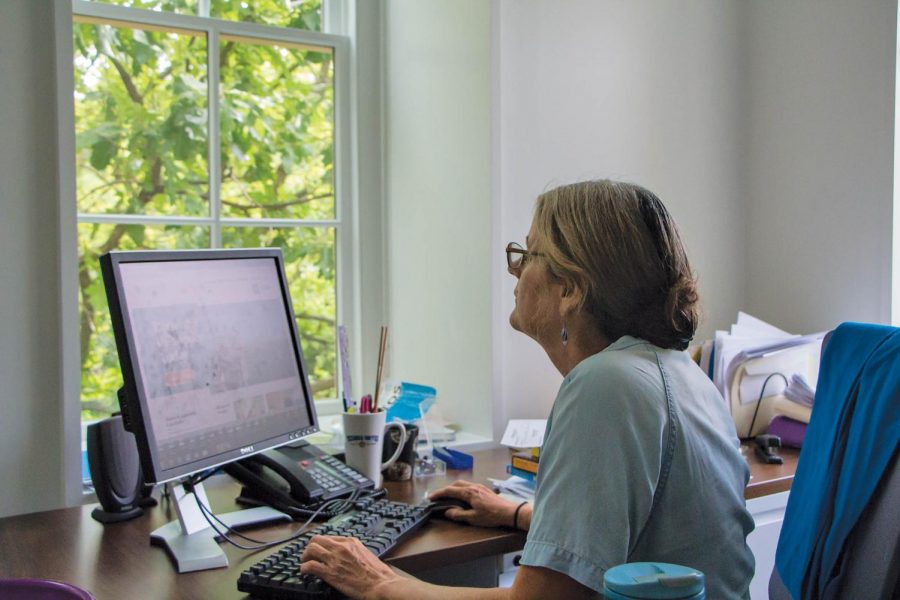Faunes says more students come in to her office later in the semester. “When you’ve broken down the barriers, at the end of the semester, you’ll have more people coming in,” Faunes said.
Language professor builds bridges with students
Language can exist as an obstacle in terms of developing relationships, but it can also be an adhesive method of communication that reveals culture and an intimate identification with another.
In terms of language at St. Edward’s, whether you are a beginner or a native language speaker looking to expand your knowledge and expertise on a particular language, language professors seek methods to diffuse students’ hesitations in language courses.
For Dr. Regina Faunes, a professor who teaches courses on Spanish language and Latin American culture, language is a bridge to cross, but it ultimately brings individuals together.
“You start to break down those boundaries, and you get to know a little bit about someone. You know a little bit more about them and they’re not just somebody sitting in a classroom who you are going to assign a grade to. It makes for a more friendly environment,” Faunes said.
For new speakers, Faunes shares that she speaks to her students about their courses, their families and their day-to-day with their limited vocabulary, in order to get to know her students and to make them feel more comfortable in the classroom.
“The best way to develop relationships with them, since it’s a language class, is to start talking about things that are familiar to them. Their family, their classes at university, but always trying to encourage the point of ‘okay you understood me, and that is great,” Faunes said. “If they said something that is not quite right, just address it. And that tends to work.”
In terms of developing relationships with native speakers, Faunes finds this a little easier, as she can reference Latin American culture and current events of Spanish speaking nations.
“In upper divisions where you have a mix, I find that that is very easy (to start conversation). In many ways, easier. Immediately, if I have a student from South America, I immediately can say, oh I bet you miss some ceviche. The smile lights up on their face because I know a little bit about where they from, and about them,” Faunes said.
By getting to know her students this way, Faunes has noticed a trend in the number of students that visit her office. She shares that when students feel comfortable, they’ll reach out more often to her because of her attempt to connect with her students.
“I feel that once you break down those barriers, students feel more comfortable coming to the office. At the beginning of the semester, kids won’t come. They’re very reluctant to come,” Faunes said. “When you’ve broken down the barriers, at the end of the semester, you’ll have more people coming in.”
Faunes not only recognizes that building relationships with her students incentivises them to reach out to her, but she also notes that it allows them to feel more at ease in the classroom. Whether a student is cautious to participate or having difficulty with comprehending conversations in the classroom, Faunes notes that by breaking down barriers with her students, they reap a better learning experience.
“It goes a huge way towards the better learning experience for the student. I’ve read this in studies of language classes, but sometimes students are so uptight and their hands will sweat and they really can’t hear or process what you’re saying,” Faunes said. “They’re so worried about getting called on and being able to say what they need to.”
Faunes believes that breaking down barriers translates into courses all over the board. Although she doesn’t believe that it is impossible to teach a student without a relationship, she does believe it aids the student’s experience in the classroom.
“Language is so foreign, but I think this translates into even physics classes or in a chemistry class where students are like what? Where a professor might ask them something and they don’t know and they don’t feel comfortable saying that they don’t understand, where they might feel that intimidated or cowed by a professor, or the presence of a professor. That can’t be a good thing,” Faunes said.
“So I think that even in those classes, it goes a long way to break down what prevents a student from saying ‘I don’t know, or ‘can you repeat that’, or ‘can you help me’. I think it’s definitely a big piece.”
